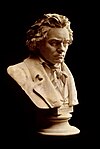Der glorreiche Augenblick
Der glorreiche Augenblick, Op. 136 (The glorious moment) is a cantata by Ludwig van Beethoven.
Composition
[edit]
Der glorreiche Augenblick was written for the opening of the Congress of Vienna after the end of the Napoleonic Wars.[1] Beethoven had initially supported Napoleon, famously dedicating his Eroica Symphony to him, but rejected him after Napoleon declared himself Emperor and scratched the dedication off the title page so violently that he tore the page. The cantata is scored for two sopranos, tenor and bass soloists, chorus and orchestra. It sets texts by Alois Weissenbach. The Cantata was written in 1814, but not published until 1837, hence the high opus number.[2]
Structure
[edit]The work consists of six movements:
- Chorus "Europa steht!"
- Recitative "O seht sie nah' und näher treten!"
- Aria with chorus "O Himmel, welch' Entzücken!"
- Recitative "Das Auge schaut"
- Recitative and quartet "Der den Bund im Sturme fest gehalten"
- Chorus: "Es treten hervor"
Instrumentation
[edit]- SATB choir
- children's choir (last movement only)
- 4 soloists (soprano, mezzo-soprano, tenor and bass)
- piccolo (last movement only)
- 2 flutes
- 2 oboes
- 2 clarinets in A, B♭ and C
- 2 bassoons
- 4 horns in various keys
- 2 trumpets in various keys
- 3 trombones (alto, tenor and bass)
- triangle, bass drum and cymbals (last movement only)
- timpani
- 1st violins (the third movement contains an extensive part for solo violin)
- 2nd violins
- violas
- cellos
- double basses
- The soloists are personas: the soprano is the city of Vienna, the mezzo-soprano is the Prophetess, the tenor is the Genius and the bass is the Leader of the People.
Notes
[edit]- ^ Ashley, Tim (7 June 2012). "Beethoven: Der Glorreiche Augenblick; Choral Fantasia – review". The Guardian. Retrieved 9 June 2019.
- ^ Cummings, Robert. "Der glorreiche Augenblick, cantata for soloists, chorus & orchestra, Op. 136". AllMusic. Retrieved 9 June 2019.
External links
[edit]| Life | ||
|---|---|---|
| Music | ||
| Memorials | ||
| Depictions |
| |
| Family | ||
| Related | ||
| International | |
|---|---|
| National | |
| Other | |
Text is available under the CC BY-SA 4.0 license; additional terms may apply.
Images, videos and audio are available under their respective licenses.

